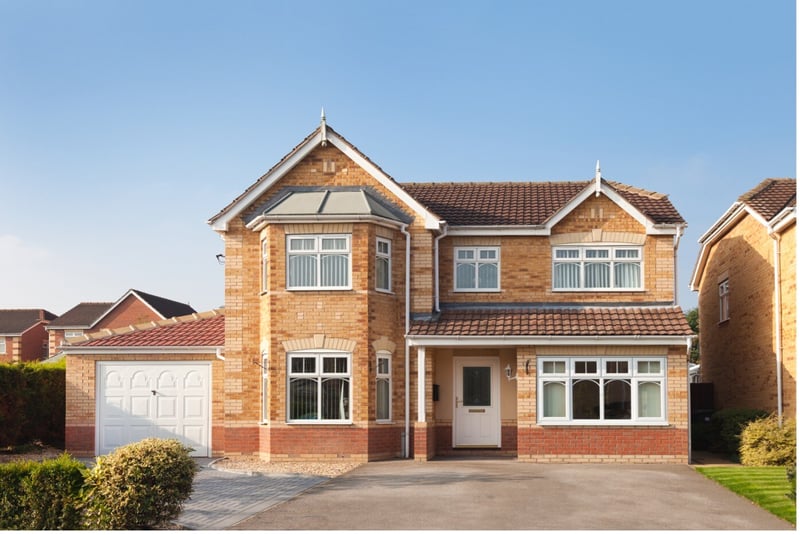Forever Home: Top tips for buying your Forever Home by Vaila Morrison RIBA

The demand for a Forever Home has grown steadily last five years, even as Google searches for new homes have dipped, reflecting a nationwide desire for stability and lasting comfort. Finding your Forever Home is a remarkable milestone in life, a place where you envision creating cherished memories, nurturing your family, and truly settling down.
But what are the most important aspects you should look out for when finding your forever home?
Our Inclusive Home Design expert and sustainability queen, Vaila Morrison RIBA advises on the top considerations for buying your Forever Home that'll suit your family's lifestyle.
Buying a forever home - what to prioritise
A Forever Home is one that you can imagine yourself living in for the rest of your life, your sanctuary, somewhere you will feel safe and comfortable for your whole life. Somewhere to make memories.
Whenever you choose to start looking for your Forever Home, and whatever features are on your wish list, it's vital that you take certain considerations into account – and this includes not just whether you can see your entire family in the home, but how you can adapt the house or, if the need be, extend it.
People's homes are usually the biggest purchases they ever make. So, having 'forever' in mind can really help in the long run. Here’s what you’ll need to think about when making that all-important purchase decision.

Priority 1: Location, location, location
As Kirstie Allsopp and Phil Spencer will tell you, it’s not always just houses that makes forever homes.
The quest for your forever home is a question for how you want your life to be, so narrowing down your property's location is very important consideration. City or country? Quiet, tranquil spaces or bustling communities? And will you feel the same as you age?
It’s crucial to consider local connections. For instance, what's the nearest city? What's the town centre like - and is it somewhere you see yourself going? If you don't work remotely, how will you travel to work? For young families, school catchment areas are also a vital consideration. It can be worth paying a little more to give your children access to better schools or to avoid commuter nightmares.
There’s no same answer for everyone, it's worth noting down the top priorities for you.
Other factors that make a location "right" for a forever home can be proximity to family and friends and ease of access to amenities and healthcare. Do you want the essential things to be within walking distance, accessible by public transport, or do you not mind being more reliant on the car? Are taxis or delivery services in the area if, for any reason, you can’t or don’t want to drive?
It's always worth spending time in your chosen location. You'll get a sense of the local community and how easy it is to do things. You'll also learn far more about the place than any research online can tell you - for instance, if you've fallen for a place in the countryside, you might be put off discovering noisy nearby major motorways.

Priority 2: The house itself
Again, this will be very different according to individual wants, needs and style, but one of the main things to consider for your forever home is having suitable spaces in terms of size and future flexibility.
Traditionally, a 'forever home' is a larger house than a starter home. Growing families will want to ensure they have enough bedrooms moving forward. Those working remotely may be looking for a house with more space for a home office. Those with older children, meanwhile, may be looking for forever homes for other reasons, such as enjoying the space of the nearby countryside.
Bigger isn't always better - a forever home is all about living quality, first and foremost.
As your life unfolds, a Forever Home will need to be flexible enough to work with you and your needs. This is why many people look for houses with an internal layout that includes an open plan living space that allows for changes over time, or features that are naturally inclusive for all ages and abilities from the start.
Even if your house is move-in ready, it's important to imagine how easy it will be to make adjustments when you inevitably need them. For instance, installing a home lift as you age will not only help you move comfortably between floors in your home but also add value to your property.
The same goes for future extensions. If you think you'll need further space, it's worth looking into how easy it'll be to get planning permission. Look at other properties in the area for a good guideline.

Priority 3: Upkeep and maintenance
Thorough research is what turns a good investment into a great investment.
A thatched cottage with a beautiful country garden may seem like the romantic dream house for settling down. But while that thatch is a wonderful feature, it can be a hassle (and an additional expense) to maintain. It's important to consider what TLC different homes might need throughout the years - as you'll be committing to this, too.
In some cases, older properties will hold their own in terms of longevity. However, they also tend to require more general maintenance and cost more to heat than newer and more environmentally friendly properties. You may find your heating bill is significantly higher due to draughts - no matter how vigilant you are on the heating controls!
Likewise, having a good-sized garden is a lovely way to enjoy fresh air, but it is a commitment that can become more challenging to cope with later. If gardening is your thing, look at Stannah’s gardening expert Mark Lane’s articles for some fantastic ideas for making your garden more accessible.

Priority 4: Resale
A Forever Home is a significant emotional investment, and it takes energy and time to pick the perfect place. But it’s crucially a financial one. No matter how much planning you do, there is always the possibility that your circumstances may change.
In uncertain times, changed life plans, or even different opportunities that take you elsewhere, you may want or need to move again in the future. So - even though it feels strange to do at this stage - don’t forget to research the resale value.
All the above considerations should be packed into what you can realistically afford. Don't forget there are additional expenses - like surveyor fees and arrangement fees - that'll add to the initial cost of your forever home. But if you get it right, it'll be worth every penny.

Ask Vaila: When should I start looking for a Forever Home?
I don’t think there’s ever really a right time - as with most of the housing market - and it does also depend on the ballpark budget figure you have available. Indeed, the decision to buy a forever home will differ greatly from person to person.
When you are young, free and single, or a young couple starting your lives together, the future is much less certain, and it’s highly unlikely that you’ll want to commit to anything that seems forever. However, this time in your life can help inform your choices when the time is right for you to think longer term. You might find you loved some aspects of city living, perhaps less of the partying until dawn as you get older (or maybe I’m wrong!), but being close to shops, entertainment, and museums. Or perhaps you’ve constantly been yearning for a quieter village or more rural life.
Making such a big decision too early will likely make you feel constrained, even trapped. However, once life becomes more settled, you may have made other long-term commitments, a secure job, children’s schools, or maybe you are seeking to move somewhere new after retirement when you don’t need to be close to a specific place of work. Sometimes in your life, you feel more confident and comforted by a degree of permanence. Or you may just have decided ‘never again’ to the upheaval of shifting your life again!
The right time will be different for everyone, but there’s always a right time to think about futureproofing in the here and now and to think ahead when making big decisions about our homes.
We all have different needs at different life stages, but often, there’s a synergy and overlap. Some access needs you might have with a new baby in a pram are not so different from those you might need in later life. Home can also be a social place, so if you want to be able to host older or disabled relatives or friends, it’s not just your immediate family members’ needs you must think about; as such, all the bedrooms in the house should be suitable for changing needs.
Finally, don’t put too much pressure on yourself!
The main thing is don’t put too much pressure on yourself! Sometimes, we can tie ourselves in knots trying to find the perfect item – I mean, you’re not going to choose something imperfect forever, are you? – so, there’s a real danger that pursuing a ‘Forever Home’ could freeze your ability to decide what is right for you now and in the immediate future. Don’t let the idea of a perfect dream put you in your way and compromise your life in the present!
Thinking now is the right time to find your Forever Home? Read more for Vaila’s guidance on how to enhance your ‘Forever Home’ and the inclusive products to include for stress-free living.
Stay up to date
Latest Blogs

Whole Home Comfort with Stannah and HSL

Dame Zandra Rhodes x Stannah: When accessibility meets style
Could more people benefit from home adaptation support for hidden disabilities?
50 years of Stannah Stairlifts – A milestone grounded in purpose

BBC’s Dr Punam Krishan reveals a little-known Parkinson’s symptom to watch for...

Are you at risk of falling? Dr. Punam Krishan’s simple 12-second test could tell you...

Snore Wars: Could sleeping separately be the secret to a better night’s rest?

Proud to carry the Made in Britain mark!
Stairlifts made for you
All our stairlifts whether straight or curved are customised to suit you and your home so call now to arrange a visit to get your FREE personalised quote!